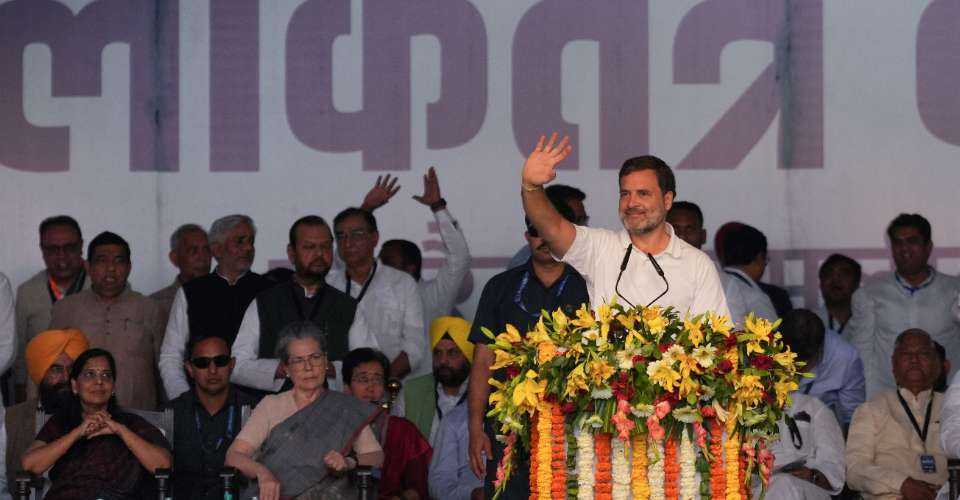
India’s Congress party leader Rahul Gandhi (center) waves at supporters during a rally organized by India’s opposition coalition comprising various political parties named ‘INDIA’ or Indian National Developmental Inclusive Alliance, in New Delhi on March 31. (Photo: AFP)
The first round of voting will take place on April 19 to elect India’s new Lok Sabha, the 543-member lower house of parliament. Pre-poll surveys and political pundits are tipping Prime Minister Narendra Modi for a third consecutive term.
However, critics say the prime minister and his pro-Hindu Bharatiya Janata Party (BJP) are displaying anxiety, citing the weaponizing of law enforcement agencies, the Income Tax Department and the Enforcement Directorate, which is mandated with probing financial crimes, against opposition parties.
Arvind Kejriwal, Delhi’s chief minister and a key leader of ‘INDIA,’ which stands for Indian National Developmental Inclusive Alliance, who is challenging BJP in the general election, was arrested on March 21 and placed in custody until April 15.
His government has been accused of corruption in the allocation of private liquor licenses and a probe into the matter has already seen two of his top allies jailed.
The timing of Kejriwal’s arrest is seen as an attempt to weaken the main challenge to Modi’s ambitious plan of winning a brute majority with 400-plus seats for the BJP and its allies within the ruling National Democratic Alliance (NDA).
Another former chief minister, Hemant Soren from the eastern state of Jharkhand, was also put behind bars over an alleged land scam.
The Modi regime is also accused of tax terrorism by the Congress party, which has had its bank accounts frozen with some 2.1 billion rupees ($25.3 million) in them put under lien — which means that they cannot be withdrawn or transferred.
Tax recovery notices have been slapped on the party that has ruled India for 54 of its 76 years since independence in 1947. The communist parties were also caught up in similar tax nets by the Income Tax authorities.
However, they told the Supreme Court on April 1 that they will not initiate any “coercive action” to recover 35 billion rupees in penalties for violations of tax exemption laws in the past by Congress, until after the election.
Congress leaders have called the action politically motivated and an attempt to financially cripple in the middle of a crucial election campaign.
Ashutosh Talukdar, a political analyst based in Assam, feels Modi has successfully weakened the opposition by various means.
“Forget India’s minorities, it is the political opponents who are feeling threatened today and feel alarmed,” he said.
Many opposition leaders accused of corruption have joined the BJP and have had investigations against them suspended or dropped by the federal agencies.
Congress leader Sanjay Das from the northeastern Meghalaya state said the BJP is misusing power to wrest the election.
“In today’s India, nothing is ruled out because no one can say ‘no’ to Narendra Modi,” he added, hinting at how federal agencies were merely doing his bidding.
According to an estimate, the Enforcement Directorate has summoned, questioned, or raided nearly 150 opposition politicians since Modi assumed office in 2014.
The INDIA alliance parties rallied together on Easter Sunday in the national capital New Delhi in an apparent show of strength.
Congress leader Rahul Gandhi called for a stop to the “fixed match” being played out by Modi and threw an open challenge saying his “BJP is not going to cross 180” forget winning 400-plus seats.
The opposition parties tried to give the impression that they were all united and set to take on Modi’s powerful juggernaut with a unity of purpose.
Political observer Paplu Vatsya in Modi’s native Gujarat state said that if the opposition is really united it could defeat Modi’s ambitious plan of gaining a brute majority in parliament.
“Modi is nervous about the prospect of having to take on a united opposition,” he observed.
Hence, the prime minister and his BJP were resorting to taking action against opponents with corruption charges, hoping it would find favor with the people, who want a corruption-free India.
“I am not just probing the corrupt. It is my guarantee that whoever has looted the people of my country, I am returning the stolen wealth of my people back to them,” Modi announced as he kickstarted the election campaign in Uttar Pradesh, the most populous state.
He said the general election was “between the BJP-led NDA, which is fighting against corruption, and the other group, which is fighting to save the corrupt.”
However, if one goes by the past, even the most powerful leaders have been defeated by a united opposition in Indian elections.
Prime Minister Indira Gandhi, also referred to as India’s Iron Lady, lost power in 1977 after she imposed a national emergency, which was marked by massive media censorship, restrictions on civil rights and a forced mass sterilization campaign.
Her son Rajiv Gandhi lost the national poll in 1989 over the issue of corruption despite winning 400-plus seats in the previous election. And in 2004, the BJP’s Prime Minister Atal Bihari Vajpayee was voted out over the issue of unemployment growth.
Modi may not be voted out as his charisma combined with aggressive pro-Hindu politics ensures he remains the favorite in the race.
“I say, the worst or the best of the Modi-led regime, depending on how one looks at it, will come in the next few years,” says social scientist Ramakanto Shanyal.
source : uca news
